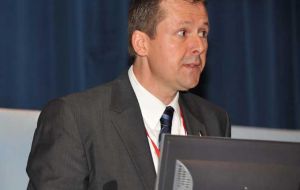MercoPress. South Atlantic News Agency
Arctic coastline crumbling due to effects of climate change, says German study
 Dr. Volker Rachold, Executive Secretary of the IASC
Dr. Volker Rachold, Executive Secretary of the IASC Arctic coastlines are crumbling away and retreating at the rate of two metres or more a year due to the effects of climate change, it has been claimed. In some locations, up to 30 metres of the shore has been vanishing every year.
The rapid rate of coastal erosion poses a major threat to local communities and ecosystems, according to a new report by more than 30 scientists from ten countries.
Two-thirds of Arctic coasts consist of frozen soil, or permafrost, rather than rock, and are highly sensitive to erosion by wind and waves. Rising temperatures are melting protective sea ice fringing the coastlines and leaving them more exposed to the elements, say the experts.
The report, “State of the Arctic Coast 2010”, says ten-year average rates of coastal retreat are “typically in the one to two metres per year range, but vary up to 10 to 30 metres per year in some locations”. Worst-hit areas include the Beaufort Sea, the East Siberian Sea and the Laptev Sea.
The study, led by scientists from the Helmholtz Association of German Research Centres and the International Arctic Science Committee (IASC), is published online and in the journal Estuaries and Coasts.
Information on more than 100,000 kilometres of Arctic coastline - around a quarter of the total - was collected for the report. The scientists stressed that Arctic coastal habitats were the “prime lifeline” for Arctic communities, supporting a large population of fish, birds and mammals, including an estimated 500 million seabirds.
They wrote: “It is evident that the coast is a critical component of the Arctic system requiring explicit attention. As a focus of human activity with attendant hazards, the circumpolar Arctic coast is clearly a priority for monitoring and detection to support pro-active adaptation and sustainable development.”
They hoped the report would help to close information gaps and “mobilise the resulting knowledge in an effective way for the betterment of Arctic coastal ecosystems, the peoples of the north and the global community”.
“This international and interdisciplinary report documents in particular the interest and expertise of German scientists in the field of Arctic coastal research” says Dr. Volker Rachold, Executive Secretary of the IASC. “Three of the international organisations involved in the report are based in Germany. The secretariats of the IASC and IPA are located at the Potsdam Research Unit of the Alfred Wegener Institute for Polar and Marine Research in the Helmholtz Association (AWI). The international coordination office of the LOICZ project is funded by the Helmholtz Centre in Geesthacht (HZG).
“When systematic data acquisition began in 2000, detailed information was available for barely 0.5% of the Arctic coasts,” revealed Dr. Hugues Lantuit from the Alfred Wegener Institute (AWI).




Top Comments
Disclaimer & comment rules-

Read all commentsArctic coastal erosion is a result of melting of permafrost.
Apr 18th, 2011 - 08:38 pm 0Melting of permafrost enables the methane clathrates to release gaseous methane.
Methane is x30 more potent a greenhouse gas than CO2.
Loss of arctic ice is accelerating the process of anthropogenic Global Warming.
Classic positive feedback system - usually characterised by irreversibility until the cusp is reached, and then the climate flips into a different stable state.
If it is a hot stable state (much the more probable condition), the entropy conditions make it, in practice, irreversible.
So, on human time-scales, permanent heat.
What happens to human societies when the standing freshwater evaporates away and frozen terrestrial freshwater melts ?
Commenting for this story is now closed.
If you have a Facebook account, become a fan and comment on our Facebook Page!